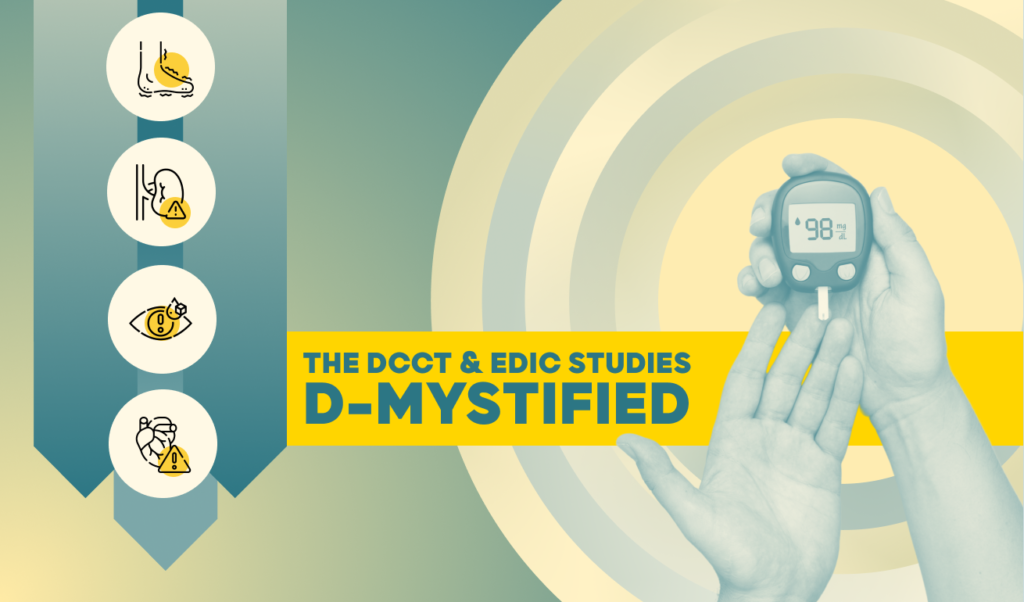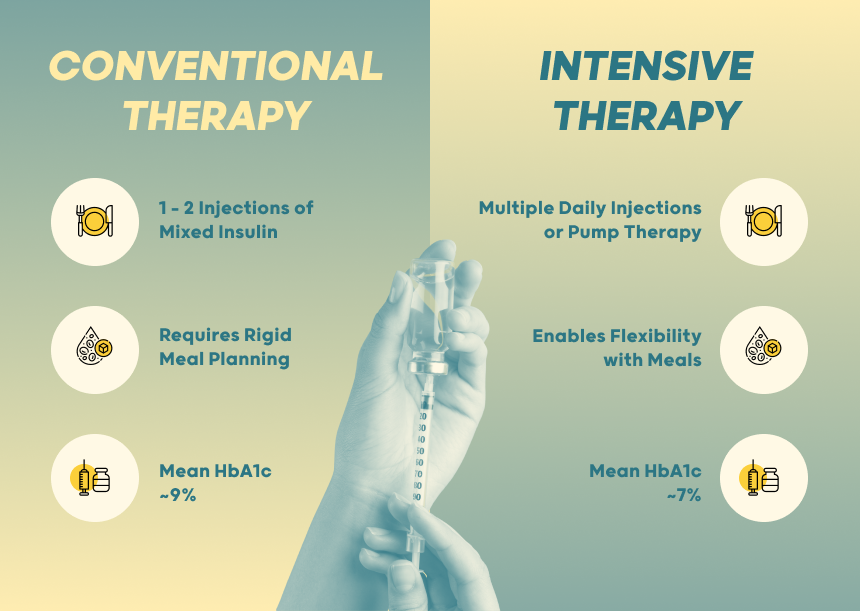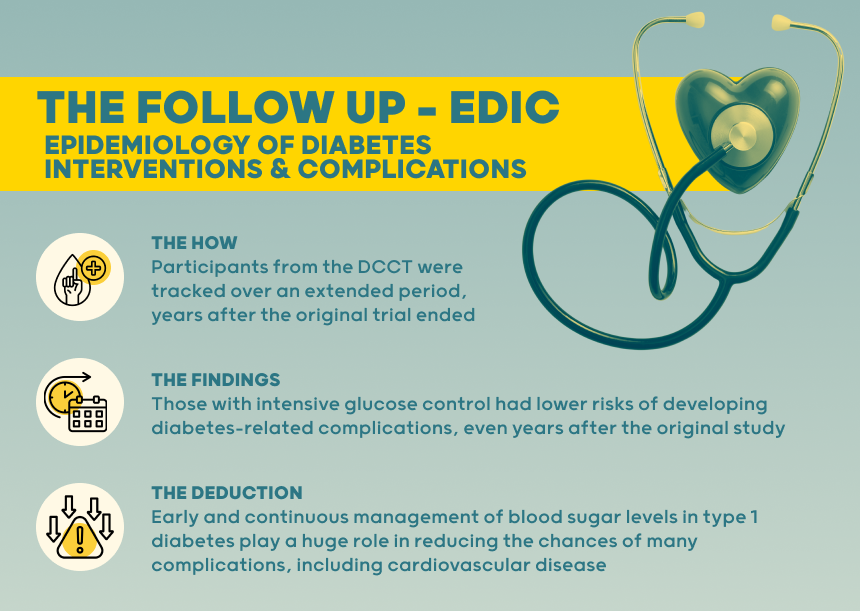Understanding the article: “The Diabetes Control and Complications Trial/Epidemiology of Diabetes Interventions and Complications Study at 30 Years: Overview”
Published Date:
December 11, 2013
Written By:
David M. Nathan and the DCCT/EDIC Research Group.
Approved By:
Dr Parth Narendran
Decoded By:
Dr. AnuHasini, MBBS, (MS ENT)
5 mins to read
- The T1D Takeaway
- For People living with type 1 diabetes, intensive therapy using multiple daily injections of insulin along with proper monitoring of blood glucose levels will help to achieve a life free from or with delayed complications of T1D.
Word Wizard
- The Diabetes Control and Complications Trial (DCCT) tested delaying complications in type 1 diabetes (T1DM). It compared intensive therapy (INT) to conventional therapy (CON) in 1,441 T1DM individuals from 1982–1993. INT aimed for normal blood sugars using insulin, observed through self-monitored glucose.
- The follow-up, Diabetes Interventions and Complications (EDIC) since 1994, tracked DCCT’s impact on advanced complications, including cardiovascular disease (CVD). In 6.5 years, DCCT showed INT reduced early microvascular disease by 35–76% compared to CON. Despite higher hypoglycemia risk, it didn’t affect mental function or quality of life.
- EDIC revealed lasting effects of intensive therapies. DCCT/EDIC shows INT effectively reduces long-term T1DM complications, improving lifespan.

Summary Snap
Shots
“Maintaining blood glucose levels as close to non-diabetic range as safely as possible reduces the occurrence of long term T1D- related complications, and people can more likely achieve lower blood glucose levels with the help of intensive insulin therapy.“
Prime Insight
This research includes two components:
- DCCT (The Diabetes Control and Complications Trial)
- EDIC (The Epidemiology of Diabetes Interventions and Complications)
DCCT was a randomized clinical trial done in people with type1 diabetes to test whether intensive compared with standard control of blood glucose delayed or prevented the complications of T1D over a period of approximately 10 years.EDIC was a study which followed the end of the DCCT, done to test the longevity of the DCCT effects on advanced T1D complications including cardiovascular disease (CVD) and has been running for over two decades.
This research helped to improve the long-term health of people with T1D.

DCCT compared the effectiveness of intensive therapy and conventional therapy in management of T1D.
Imagine the whole research as baking cookies. In DCCT, we follow a special recipe carefully and measure all ingredients to try making the perfect cookies i.e., use multiple injections of insulin and measurement of blood glucose levels and HbA1c to try and prevent complications.
In EDIC, we keep checking the cookies even after they are out of the oven to make sure the cookies don’t crumble, i.e. we follow up the results obtained from DCCT to look out for long term complications.
Together, DCCT and EDIC help us make the best cookies ever.
INTENSIVE THERAPY: This includes use of multiple daily injections and several blood glucose tests in a day. Here, the time and amount of food we consume can be controlled freely.
Insulin pumps (continuous subcutaneous injections) mimic the physiological function of the pancreas and help with better management of T1D.
CONVENTIONAL THERAPY: This includes the use of one or two doses of mixed insulin a day.
This article affirms that in comparison to conventional therapy with a mean HbA1c of 9%, intensive therapy had a mean HbA1c of 7% and showed a 35 to 76% reduction in early onset of complications.
Along with intensive therapy, self-monitoring of blood glucose is a must.
Ideal targets of such self-monitored glucose according to this research are:
- Pre meal: 70-120 mg/dl
- 2 hours Post meal: <180 mg/dl.
- Around 3am, to prevent hypoglycemia: >65 mg/dl.

SOME ADVANTAGES OF INTENSIVE THERAPY
- Delay in onset of T1D associated complications like retinopathy, nephropathy, neuropathy, etc.Decreased incidence of atherosclerosis.
- Reduced cases of myocardial infarction (MI) and stroke
- It allows us to choose when and how much we eat, giving us greater control and flexibility in our daily meal schedules.
- Intensive therapy ensures a longer and healthy life.
CONSEQUENTIAL ISSUES:
- Hypoglycemia: The study showed that episodes of severe hypoglycemia are more common with intensive therapy than with conventional therapy. However, there were no adverse effects observed on cognitive functioning due to frequent hypoglycemic episodes.
- Weight gain: Overweight and obesity have a higher incidence in people with T1D on intensive therapy than on conventional therapy.
INTENSIVE THERAPY IS SUPERIOR TO CONVENTIONALTHERAPY IN PREVENTING OR DELAYING COMPLICATIONS ASSOCIATED WITH T1D AND MAINTAINING HBA1C AND IN THE LONG RUN.
- A Deeper Dive
- The Sources Voice
Intensive therapy is more effective in
reducing/preventing the long-term complications of T1D and enhancing the potential for an extended and healthy lifespan.
- Curiosities Clarified
Regular monitoring of blood glucose levels and ensuring that you are taking the correct dose of insulin can prevent hypoglycemia up to a larger extent. Carb counting and having balanced meals also help. Learn to identify the symptoms of hypoglycemia and promptly treat the low blood glucose. Always carry a source of fast acting carbohydrate, such as glucose tablets, juice, candy and have them in case of a hypoglycemic episode.
A balanced diet with fiber, protein, and healthy fats along with carbohydrates, while carefully counting your carbs and taking insulin accordingly makes a big difference. Watching your portion size plays a vital role for keeping your weight in check. Regular exercise and keeping an eye on your blood glucose levels is also important. If you are still gaining weight despite these efforts, consult your health care professional to investigate other possible reasons.
For an adult with T1D, it is advised to get tested for retinopathy at least once a year.
For children, it is advised to get it tested for the first time after 3-5 years of having T1D and from then on, once a year.
